Humans are caught up with the rapidly changing life around us. We rarely have time for ourselves, especially for physical and mental health. Due to our busy schedules, we all became lazy and were affected by many illnesses. Living a sedentary lifestyle can have negative consequences on our health. Do not worry; heard of the phrase “Yoga se hi Hoga”? Yoga, a 3000-year-old ancient practice, uses components like asanas and pranayamas to improve physical and mental health. This post will highlight the steps, benefits, and much more of a popular asana called markatasana1. Let us discuss more the Markatasana and its health benefits.
Did you know?
Markatasana is also called the spinal twist pose, monkey pose, or markat asana. Markatasana is derived from Sanskrit words, “Markat”, meaning monkey, and “asana,” meaning yoga or posture. So, therefore it is also called the monkey pose2,3.
In my opinion, Markatasana may provide the added benefit of stimulating the spinal cord in the cervical area. This gentle yoga posture might provide a boost to the neck region, promoting flexibility and vitality in that part of the spine6.
Dr. Rajeev Singh, BAMS
Markatasana yoga must be done properly for maximum health benefits. One may perform Markatasana yoga in the following manner:
From my perspective, practising Markatasana might help relax the spine, relieving lower back pain, and stretching the muscles in your neck and shoulders. It’s a great yoga pose to try if you’re looking for some relief and relaxation in the mentioned areas6!
Dr. Siddharth Gupta, B.A.M.S, M.D (Ayu)
Keeping the origin and history in mind, let us discuss some benefits of Markatasana, which will make this asana worth trying. Enlisted below are a few health benefits of Markatasana.

A sedentary lifestyle characterized by long periods of inactivity can impair the ability of the body to break down fats. This leads to fat accumulation in the body, increases obesity, and increases the risk of other diseases. Shirley et al. conducted a study3 in 2014 to assess the effect of yoga intervention on obesity. The yoga intervention included asanas like Markatasana, and it was found that it resulted in a reduction in BMI. Additionally, the practice of this asana increases the levels of leptin, a hormone that regulates body weight. Therefore, yogasanas like Markatasana and other asanas may positively impact obesity. However, Markatasana should not be considered an alternative to modern medicine. Kindly consult a doctor for proper management of obesity. Additionally, it is advised to perform this asana under the supervision of a qualified trainer3.
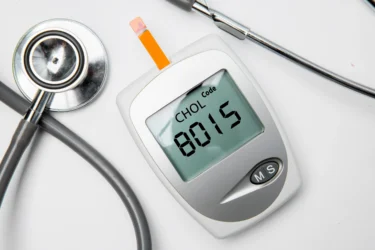
A lipid profile is a blood test done to measure the body’s total cholesterol levels. Determination of cholesterol is important as an elevated level of cholesterol in the body can be a risk factor for various cardiac diseases. A study3 by Shirley et al. in 2014 stated that markatasana might help reduce total cholesterol, low-density lipoprotein, or bad cholesterol. Furthermore, this asana may help in reducing serum adiponectin and triglycerides. Thus, the Markatasana may positively impact your lipid profile, but depending on this, asana should not be considered an alternative to modern medicine. Kindly consult your doctor for the proper treatment of an abnormal lipid panel. Additionally, it is recommended to practice this asana under the supervision of a qualified trainer3.

Social anxiety disorder (SAD) or social phobia is immense nervousness in normal situations due to a fear of being watched by others. This issue is often ignored, and its management is still less understood. Danish et al. conducted a study4 in 2022 to assess the effect of yogasanas like Markatasana on health. A daily thirty-minute practice of asanas like Markatasana positively impacted SAD. Additionally, this asana helped in reducing the severity of bladder shyness and agoraphobia (fear of places or situations). However, it is recommended not to rely on this asana alone and consult a doctor to treat social phobia properly. Additionally, one should have proper training in this asana under the guidance of a qualified trainer4.

The COVID-19 pandemic, a global crisis, is an infectious disease caused by the SARS-CoV-2 virus. Immune-compromised individuals are always at a high risk of infections. Daily performing yogasanas like Markatasana helped build herd immunity, boost overall health immunity, and facilitate recovery. Thus, training Markatasana and other asanas may enhance the immune system and fight infections like COVID-19. But this asana should not be considered an alternative to modern medicine. So, kindly consult a doctor for proper treatment and not rely on this asana alone. Additionally, one should practice this asana under the supervision of a qualified trainer5.

The above-mentioned benefits of Markatasana are done in a limited human population and are purely based on a literature search. Therefore, we need more studies to ascertain these claims in larger populations.
Yoga exercise may help develop the mind and body; it is not a choice to modern medicine or treatment. Therefore, you must not rely on or depend on Yoga (asanas) alone to treat any condition. Instead, please consult a qualified or ayurvedic doctor who can assess your condition and advise accordingly. Furthermore, it is necessary to perform and learn Yoga under the supervision or guidance of a trained yoga expert to avoid any injuries.
If you have recently undergone abdominal or back surgery, I may advise you to avoid practising Markatasana. It’s important to seek further guidance and consultation from your doctor before starting this yoga practice6.
Dr. Smita Barode, B.A.M.S, M.S.
Also Read: Benefits of Utthita Parsvakonasana and How to Do it By Dr. Himani Bisht
Conditions where Markatasana should be performed with caution are:
Conditions where Markatasana is contraindicated include:
Also Read: Benefits of Tiryaka Tadasana (Swaying Palm Tree Pose) and How to Do it By Dr. Himani Bisht
Markatasana is also called the spinal twist pose or the monkey pose. Markatasana is derived from Sanskrit words, “Markat”, meaning monkey, and “asana,” meaning yoga or posture. So, therefore it is also called the monkey pose. Training this asana may help improve the lipid profile and decrease obesity, social anxiety disorder, and infections like Covid-19. Additionally, this asana may help increase postural stability, improve hand-grip strength, and relax the mind and body. The practice of this asana should not be considered an alternative to modern medicine. Additionally, the practice of this asana should be performed under the guidance of a qualified trainer.
Also Read: Benefits of Ardha Halasana (Half Plough Pose) and How to Do it By Dr. Ankit Sankhe
Markatasana is also called the spinal twist or monkey pose in yoga. Markatasana is derived from Sanskrit words, “Markat”, meaning monkey, and “asana,” meaning yoga or posture. So, therefore it is also called the monkey pose1.
Yes, the practice of Markatasana may help in managing obesity. A study by Shirley et al. in 2014 showed that the markatasana poses reduced BMI, hip and waist circumference, and body weight2.
One may perform Markatasana in the following manner:
Roll out a mat and lie on your back with your feet together on the ground. Extend the arms sideways at shoulder level. Next, inhale, bend both knees, and turn both legs to the right side. Rotate your head to the right and gaze at the right hand. This will give a spinal twist towards the right side. Breathe out and repeat the steps with another side (left).
The practice of this asana may help improve an abnormal lipid profile, manage obesity, reduce the severity of infections like covid-19 and help manage social anxiety disorder. Additionally, this asana may help increase postural stability, improve hand-grip strength, and relax the mind and body3,5.
In Indian mythology, many asanas are named after the vanara of the ancient scripture Ramayana. One such asana is markatasana or the monkey pose. This asana signifies a monkey posture, and it is believed that monkeys are easily distracted; there are even terms like “monkey-mind” describing a tendency of the human mind to leap from one object to the other. On the contrary, markatasana is a reclining posture focused on meditative practice.
Disclaimer: The information provided here is for educational/awareness purposes only and is not intended to be a substitute for medical treatment by a healthcare professional and should not be relied upon to diagnose or treat any medical condition. The reader should consult a registered medical practitioner to determine the appropriateness of the information and before consuming any medication. PharmEasy does not provide any guarantee or warranty (express or implied) regarding the accuracy, adequacy, completeness, legality, reliability or usefulness of the information; and disclaims any liability arising thereof.
Links and product recommendations in the information provided here are advertisements of third-party products available on the website. PharmEasy does not make any representation on the accuracy or suitability of such products/services. Advertisements do not influence the editorial decisions or content. The information in this blog is subject to change without notice. The authors and administrators reserve the right to modify, add, or remove content without notification. It is your responsibility to review this disclaimer regularly for any changes.
Yoga is an age old method of asanas (poses or postures) and pranayamas (breathing techniques). This yoga offers physical and mental benefits for all age groups. Yoga finds root in the Sanskrit word “Yuj” meaning union or to join. Mind body fitness involves muscular activity and a focus on awareness of self, energy, and breathing. Yoga is more like an art than a restricted workout routine, which believes that healing comes from within. Regular yoga training may help you feel better from head to toe. This section will highlight one asana called Konasana1,2. Let us discuss the Konasana and its health benefits.
Konasana is also known as the sideway bending pose or the angle pose yoga. The word is derived from the Sanskrit words “Kona” meaning angle, and “asana” meaning pose or posture, translating to the angle pose in English. This posture has two variations, Konasana I and Konasana II both involve sideways stretching using both hands3.
Konasana must be done properly for maximum health benefits. One may perform Konasana in the following manner:
Did you know?
Konasana benefits are as follows:

Diabetes (Type I and Type II) is a metabolic disorder or issue characterized by elevated blood glucose levels due to reduced synthesis or resistance of a hormone called insulin which regulates blood glucose. A study by Mahapure et al. in 2015 stated that yogasanas like Konasana might help reduce blood glucose levels. It is assumed that a side stretch during Konasana may result in alternate abdominal contractions and relaxations, which may result in increased secretion of insulin (the hormone that regulates blood glucose). Additionally, Konasana may help reduce oxidative stress, which is important in diabetic complications. This indicates that Konasana may help in managing diabetes. However, this asana should not be considered an alternative to modern medicine. Kindly consult a doctor for proper treatment. Additionally it is advised to exercise this asana under the supervision of a qualified trainer4.

Hypertension or high blood pressure has no noticeable symptoms, but if left untreated, it may become a risk factor for many other diseases. Lack of exercise and inactivity can lead to hypertension. Yoga may reduce high blood pressure. Along with pranayamas (breathing techniques), a few selected yogasanas, like Konasana, are prescribed for managing hypertension. Thus asanas like Konasana may positively impact blood pressure, but this asana should not be considered an alternative to modern medicine. Kindly consult your doctor for the proper treatment of hypertension. Additionally, it is recommended to perform this asana under the supervision of a qualified trainer5.
According to what I’ve observed, regular practice of Konasana might support clearer and healthier skin. It may help with frequent boils and managing pimples on the skin6.
Dr. Siddharth Gupta, B.A.M.S, M.D (Ayu)

A brain attack damages the brain due to the blockage of the blood supply. It has been found that the Konasana may improve blood circulation to the brain and help manage and may reduce the risk of stroke. The Health Ministry of India approves the Konasana and its potential for preventing stroke. This indicates that the Konasana may positively impact stroke. However, it is recommended not to rely on this asana alone and consult a doctor for proper stroke treatment. Additionally, one should perform this asana under the guidance of a qualified trainer3,5.

Regularly performing different yogasanas and pranayamas may help in reducing the symptoms of depression. Asanas like Konasana are approved by the Ministry of health and Family Welfare, India, for managing depression. Thus, the Konasana may help in alleviating depressive symptoms. However, it is advised to consult a doctor for proper treatment of depression and not rely on this asana alone. Additionally, one should perform this asana under the supervision of a qualified trainer5.

Obesity is the accumulation of more body fat which may increase the risk of several diseases. It is now evident that regular yoga (Konasana) may positively impact obesity by reducing body weight and excess body fat. The Ministry of Health and Family Welfare approved the Konasana for managing obesity. However, one should not consider this asana an alternative to modern medicine. Kindly consult your doctor for proper treatment. Additionally, it is recommended to exercise this asana under the supervision of a qualified trainer5.

Asanas like Konasana is approved by the Ministry of Health and Family Welfare, India, for managing asthma. This sideway stretch may help in opening chest muscles and improving breathing. Thus, the Konasana may positively impact asthma. It may not help in clinically treating asthma but may provide symptomatic relief. However, it is advised to consult a doctor for proper treatment of asthma and not rely on this asana alone. Additionally, one should follow this asana under the supervision of a qualified trainer5.
Also Read: Benefits of Sarpasana (Snake Pose) and How to Do it By Dr. Himani Bisht

The above-mentioned benefits of Konasana are not yet proven in any human study and are based on a literature search.
Yoga exercise may help develop the mind and body it is not an alternative to modern medicine or treatment. You Should not rely on Yoga alone to treat any condition. Instead, please consult a qualified doctor who can assess your condition and advise accordingly. However, it is necessary to perform and learn Yoga under the supervision of a yoga master to avoid any injuries.
In my view, Konasana may have potential benefits for increasing height. By practising this yoga asana, you engage in a deep side stretch and twist, which may enhance overall body flexibility and alignment. However, it’s important to note that individual results may vary, and maintaining a healthy lifestyle with proper nutrition is essential for optimal growth and development6.
Dr. Smita Barode, B.A.M.S, M.S.
Also Read: Benefits of Shashankasana (Rabbit Pose) and How to Do it By Dr. Himani Bisht
Conditions, and contraindications of Konasana, include3:
It is advised to perform Konasana under the guidance of a qualified trainer. Additionally, this asana should not be considered a substitute for modern medicine.
I may provide you with a beneficial tip. Practising Konasana slowly and mindfully may offer relief from sciatica. However, always remember to listen to your body and consult a healthcare professional if needed6.
Dr. Rajeev Singh, BAMS
Konasana yoga is also known as the sideway bending pose or the angle pose yoga. The word is derived from the Sanskrit words “Kona” meaning angle, and “asana” meaning pose or posture, translating to the angle pose in English. This asana may positively impact diabetes, asthma, hypertension, obesity, stroke, and depression. Additionally, Konasana may help tone and strengthen side muscles, improve digestion, and relieve constipation and back pain.
Also Read: Benefits of Vakrasana (Spinal Twist Pose) and How to Do it By Dr. Himani Bisht
Konasana is also known as the sideway bending pose or the angle pose. The word is derived from the Sanskrit words “Kona” meaning angle, and “asana” meaning pose or posture, translating to the angle pose in English3.
Konasana yoga has two variations, Konasana I and Konasana II; both involve sideways stretching using both hands3.
First, roll out a mat and stand in Tadasana. Ensure your body is aligned from head to toe, your feet are placed at shoulder level, and your neck is straight. Take a deep breath and proceed. Next, slowly raise your right arm over the head, up in the sky, and bend your upper body to the right meanwhile, the left hand will be placed sideways, touching the left thigh. Keep the legs and hips fixed only curve the spine sideways, giving it a side stretch. Continue to hold this position for six seconds. Next, exhale and return to the original position. Repeat the above steps with the left arm. This sequence completes one round of Konasana3.
Regular training in this asana may help in reducing diabetes, hypertension, asthma, stroke, and depression and managing obesity. Further, this asana may help strengthen the side muscles, relieve constipation, and improve digestion4,5.
People with hypertension and other cardiac complaints, spinal or neck injuries, and pregnant women should avoid doing this asana3.
Disclaimer: The information provided here is for educational/awareness purposes only and is not intended to be a substitute for medical treatment by a healthcare professional and should not be relied upon to diagnose or treat any medical condition. The reader should consult a registered medical practitioner to determine the appropriateness of the information before consuming any medication. PharmEasy does not provide any guarantee or warranty (express or implied) regarding the accuracy, adequacy, completeness, legality, reliability, or usefulness of the information; and disclaims any liability arising thereof.
Links and product recommendations in the information provided here are advertisements of third-party products available on the website. PharmEasy does not make any representation of the accuracy or suitability of such products/services. Advertisements do not influence the editorial decisions or content. The information in this blog is subject to change without notice. The authors and administrators reserve the right to modify, add, or remove content without notification. It is your responsibility to review this disclaimer regularly for any changes.
Yoga, rooted in Indian origin, has gained the limelight over the few years for its numerous health benefits. This 5000-year-old discipline was developed to unite mind and body. There are different forms of yoga but the purpose remains the same. Some yoga styles may be vigorous and intense, while others may be relaxing and meditative. Whatever type, yoga is always a great option for strengthening and stretching the body, focusing the mind and relaxing the spirit. Yoga focuses on asanas (poses) and pranayamas (breathing); one such asana is kandharasana. Here’s what you need to know about kandharasana1.
Did you Know?
Kandharasana, or shoulder pose yoga, is a yoga posture lifting the spine. The name is rooted in Sanskrit words ‘kandha’, meaning shoulder and ‘asana’, meaning ‘pose or posture’. Chakrasana is the preparatory pose for kandharasana. Any forward bending posture can be performed as a follow-up pose for kandharasana. In chakrasana, the back is arched, the head is lifted from the ground, and the whole body weight is supported on both the hands and legs. Whereas in kandharasana, the head rests on the ground, the chest and buttocks are raised, and the body weight is supported on the shoulders2,3.
Kandharasana must be done properly for maximum health benefits. One may perform Kandharasana in the following manner3:
When you perform Kandharasana, your back muscles arch upwards that might promote healing. By stretching yourself to your body’s limits, this asana might help in decreasing vertebral disc problems and back pain7.
Dr. Rajeev Singh, BAMS
Some benefits of this pose are as follows:

Cardiac health, or the health of the heart and blood vessels, is central to overall health. It plays an important role in pumping oxygen and nutrient-rich blood to different body parts. Poor cardiac health can be a risk factor for developing cardiac diseases. A study4 conducted by Divya et al. in 2016 stated that the practice of Kandharasana may help reduce heart rate and blood pressure. Additionally, practising it may help improve the heart’s ability to function during mild-moderate intensities. Therefore, Yogasanas like Kandharasana may positively impact cardiac health. However, Kandharasana should not be considered an alternative to modern medicine. Kindly consult a doctor for proper treatment of any cardiac disorders. Additionally, it is advised to practice this asana under the supervision of a qualified trainer4.

Obesity is the accumulation of body fat; if not controlled, it may become a risk factor for many diseases. Divya et al. conducted a study4 in 2016 to assess the health benefits of yoga interventions like kandharasana on obesity. The findings of this study showed that 41 days of practice with Kandharasana significantly reduced body weight and body mass index (BMI). Thus, the practice of asanas like Kandharasana may positively impact obesity, but the practice of this asana should not be considered an alternative to modern medicine. Kindly consult a doctor for the proper management of obesity. Additionally, it is recommended to practice this asana under the supervision of a qualified trainer4.

Menstruation or periods is natural vaginal bleeding that occurs as a part of a woman’s monthly cycle when no pregnancy occurs. Garima et al. conducted a review5 in 2022 to assess the effect of yogasanas like kandharasana on menstruation. The summary estimates of this review supported that the practice of kandharasana may help normalize menstruation. Thus, yogasanas like kandharasana might positively impact menstrual health. However, it is recommended not to rely on this asana alone and consult a doctor for proper treatment of any menstrual abnormalities. Additionally, one should practice this asana under the guidance of a qualified trainer5.

Lungs, a pair of air-filled organs located on either side of the chest, are responsible for supplying the body with oxygen and removing carbon dioxide. Along with other respiratory system organs (nose, mouth, airways, windpipe, etc.), the lungs help us breathe. Divya et al. conducted a study4 in 2016 to assess the effect of yoga interventions on the respiration system. Forty-one days of practicing yoga asanas like kandharasana increased the amount of oxygen in the body, thus improving breathing. Thus, the practice of kandharasana may positively impact the respiratory system, but the practice of this asana should not be considered an alternative to modern medicine. So, kindly consult a doctor for proper treatment of any respiratory issues, and do not rely on this asana alone. Additionally, one should practice this asana under the supervision of a qualified trainer4.

Hyperlipidemia is the elevation in lipid components like triglycerides, total cholesterol and reduced levels of high-density lipoprotein. A study4 by Divya et al. in 2015 stated that the practice of yogasanas like kandharasana resulted in a significant decrease in total cholesterol, triglycerides, and bad cholesterol. Additionally, kandharasana improved the level of good cholesterol in the body. This indicates that yogasanas like kandharasana may have a positive impact on hyperlipidemia. However, it is advised to consult a doctor to manage hyperlipidemia and not rely on this asana alone. Additionally, it is recommended to practice this asana under the supervision of a qualified trainer4.

The thyroid gland helps regulate different body functions like metabolism, growth and development by releasing thyroid hormones in the blood. Iodine is an important element required for the synthesis of thyroid hormone. Iodine deficiency can result in a decreased synthesis of thyroid hormone; this condition is called hypothyroidism. A review6 done by Mohan et al. in 2022 stated that yogasanas like kandharasana might help manage hypothyroidism. Kandharasana activates the throat chakra (vishuddha chakra), which may improve the functioning of the thyroid gland and increase iodine availability in the body. This indicates that kandharasana may positively impact hypothyroidism. However, further studies need to be done to support these claims. Therefore, it is advised to consult a doctor for proper treatment of hypothyroidism and not rely on this asana alone. Additionally, one must perform this asana under the supervision of a qualified trainer6.
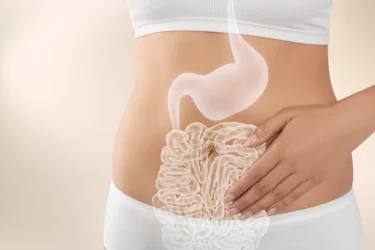
Note- The above-mentioned benefits of kandharasana are not proven in any human study yet, and are based on a literature search.
Yoga practice may help develop the mind and body; however, it is still not an alternative to modern medicine. Therefore, you must not rely on Yoga alone to treat any condition. Instead, please consult a qualified doctor who will be able to assess your condition correctly and advise accordingly. Moreover, it is necessary to practice and learn Yoga under the supervision of a trained yoga teacher to avoid any injuries.
I would highly recommend that you should perform Kandharasana either before or after any forward-bend position. Kandharasana usually acts as a preparatory pose for chakrasana. To avail maximum benefits, you can do three rounds of kandharasana or more according to your level of physical fitness7.
Dr. Siddharth Gupta, B.A.M.S, M.D (Ayu)
Conditions, where kandharasana should be performed with caution are:
Conditions, where kandharasana is contraindicated include3:
Also Read: Benefits of Markatasana (Monkey Pose) and How to Do it By Dr. Ankit Sankhe
Kandharasana, or shoulder pose yoga, is a posture lifting the spine. The name is rooted in Sanskrit words ‘kandha,’ meaning shoulder, and ‘asana,’ meaning ‘pose or posture.’ Chakrasana is the preparatory pose for kandharasana. Any forward bending posture can be performed as a follow-up pose for kandharasana The practice of this asana may help improve lipid profile, menstrual cycle, breathing, manage obesity and improve cardiac health. Additionally, this asana may help improve digestion, strengthen shoulders, improve postural stability and may provide relief from back pain, stress and anxiety.
Also Read: Benefits of Tiryaka Tadasana (Swaying Palm Tree Pose) and How to Do it By Dr. Himani Bisht
Kandharasana, or shoulder pose yoga, is a posture lifting the spine. The name is rooted in Sanskrit words ‘kandha,’ meaning shoulder, and ‘asana,’ meaning ‘pose or posture.’ Chakrasana is the preparatory pose for kandharasana. Any forward bending posture can be performed as a follow-up pose for kandharasana. In chakrasana, the back is arched, the head is lifted from the ground, and the whole body weight is supported on both the hands and legs. Whereas in kandharasana, the head rests on the ground, the chest and buttocks are raised, and the body weight is supported on the shoulders1.
Chakrasana is the preparatory pose for kandharasana2.
First, lie flat on your back on a mat. Next, take a deep breath and bend your knees, and place your feet flat on the mat with your heels touching your buttocks. Ensure your feet and knees are hip-width apart. Now, try to touch the ankles with your hands. This is the starting position. Next, slightly raise your buttocks and try to arch the back upward. Slowly lift your chest as high as possible, and avoid straining and moving the feet or shoulders. In this final position, your body will be supported by the head, neck, shoulders, arms, and feet. Breathe slowly and deeply and hold this pose for as long as possible. Breathe out and return to the initial position, and practice for four-five rounds3.
The practice of this asana may help improve lipid profile, breathing, cardiac health, and menstrual cycle and manage obesity and hypothyroidism. Additionally, this asana may help improve digestion, reduce stress and anxiety, relieve back pain, strengthen shoulders and improve postural alignment2,6.
The practice of Kandharasana is known to activate the third eye chakra (Ajna chakra), crown chakra (Sahasrara chakra), solar plexus (Manipura chakra) and throat chakra (Vishuddha chakra).
Disclaimer: The information provided here is for educational/awareness purposes only and is not intended to be a substitute for medical treatment by a healthcare professional and should not be relied upon to diagnose or treat any medical condition. The reader should consult a registered medical practitioner to determine the appropriateness of the information before consuming any medication. PharmEasy does not provide any guarantee or warranty (express or implied) regarding the accuracy, adequacy, completeness, legality, reliability, or usefulness of the information; and disclaims any liability arising thereof.
Links and product recommendations in the information provided here are advertisements of third-party products available on the website. PharmEasy does not make any representation of the accuracy or suitability of such products/services. Advertisements do not influence the editorial decisions or content. The information in this blog is subject to change without notice. The authors and administrators reserve the right to modify, add, or remove content without notification. It is your responsibility to review this disclaimer regularly for any changes.
Isn’t it thought-provoking that yoga does not change how we see things; it transforms the person who sees? Yoga relies on your own body to strengthen it, and it uses the body to heal the body. This is what makes yoga different from other exercises. Other exercises primarily focus on external equipment and induce stress on the body. The most significant aim of yoga is to create a deep sense of unity with all living forms and compassion within1. Like other therapies, yoga alone is not the solution to any health issue, but in conjunction with different treatment approaches, yoga has the potential to offer greater well-being.
Yoga often sees the practice of asanas, one of which is Rajakapotasana or the pigeon pose. Let us look at some exciting features and benefits of Rajakapotasana.
Did You Know?
Rajakapotasana, or the pigeon pose, is one of the seated back-bending asanas (posture). It is also known as Eka pada Rajakapotasana. The term “Rajakapotasana” is derived from the Sanskrit words “Raja”, meaning king, “kapota”, meaning pigeon and “asana”, meaning seat or posture. In this pose, the chest is pushed forward like a strutting pigeon, hence the name. This asana is the second level of Kapotasana and is also known as Ek pada Rajakapotasana (one-legged king pigeon pose). In the 20th century, Krishnamacharya’s pupils described this pose for the first time2.
Rajakapotasana must be done properly for maximum health benefits. Therefore, one may perform this asana in the following manner:
It might be challenging for novices to maintain square hips in the pigeon stance. From my knowledge, if your back hip hurts, you need to correct your posture. You should feel a stretch in your front hip. In the Rajakapotasana stance, your shin should be parallel to the front of your mat. You will experience stress in your knee or ankle if your shin is not parallel. If the pressure irritates your knees, keep a soft cloth beneath your knee and thigh. It will aid with knee protection9.
Dr. Smita Barode, B.A.M.S, M.S.
The classic pigeon pose is known to provide several benefits beyond the mat, which are described as under:

Neurodegenerative disorders are characterized by progressive loss of neurons. Charlene et al. presented a case study4 in 2014, of a 61-year-old male patient with AML (adrenomyeloneuropathy), a rare type of neurodegenerative disorder; characterized by demyelization of nerve cells along the spinal cord resulting in paralysis and weakness, stiffness in lower limbs. The efficacy of a 10-month yoga intervention, including pranayamas and different asanas like Rajakapotasana, was studied in the patient. Results supported yogic postures like the pigeon pose and other pranayamas helped improve the patient’s balance, walking and intellectual intuition. However, the results of this case study should not be generalized to other individuals or disease conditions as more research is needed in this area. You should consult a doctor for proper treatment and not rely on this asana alone. Additionally, it is advised that a practitioner performs this asana under the guidance of a qualified trainer4.

Studies show that yoga helps stimulate the parasympathetic nervous system to aid the functioning of the autonomic nervous system. So-Jung Kim et al. conducted a study5 in 2022 on single mothers to verify the effectiveness of yoga intervention in managing depression. The yoga intervention consisted of five asanas, including Rajakapotasana. It is observed that people with depression have spines curled forward as they usually bend their heads. So, therefore breathing is not smooth in these individuals due to the tilt of the chest. Rajakapotasana causes the chest to expand; thus, yoga asanas like Rajakapotasana may help manage depression. However, do not rely on this asana alone if you experience major episodes of depression. It is recommended to consult a physician in such cases. Additionally, one should perform these asanas under the supervision of a qualified trainer5.

Several studies have supported the use of yoga intervention to modify cardiac risk factors like blood pressure. Parco et al. conducted a study6 in 2015, to examine the effects of one year yoga intervention on cardiovascular risk factors like blood pressure. The yoga intervention included several asanas along with Rajakapotasana Systolic blood pressure tended to improve following the yoga intervention. Thus, Rajakapotasana, when performed along with other pranayamas and asanas, may help manage high blood pressure; but should not be considered a substitute for modern medicine. Consult a doctor if you have any health issues. It is advised to practice this asana under the supervision of a qualified trainer6.

Rajakapotasana may help enhance muscular strength and flexibility. Caren Lau et al. conducted a study7 in 2015 to assess the effect of yoga intervention on muscular strength and flexibility. This yoga intervention which included Rajakapotasana had a favourable impact on muscular flexibility, strength. Even then, it can only be said it might help in improving our muscle strength. However, this asana must not be considered an alternative to modern medicine. Kindly consult a doctor if you have any muscular abnormalities. Additionally, a practitioner must perform this asana under the guidance of a qualified trainer7.
Rajakapotasana is believed to increase the range of motion in the hips. Additionally, it might make the muscles that support the lower back and hips stronger. By allowing the muscles and tendons that surround the spine to stretch, the pigeon stance may also aid with lower back discomfort. Extending the piriformis muscle may also aid with the relief of sciatica9.
Dr. Siddharth Gupta, B.A.M.S, M.D (Ayu)
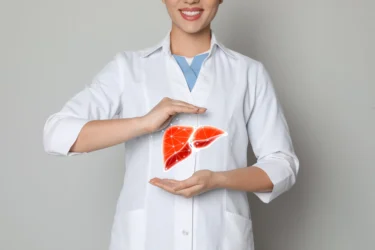
Rajakapotasana may help stimulate the kidney and liver meridians through the inner groin. The lumbar arch stimulates the urinary bladder meridian, which rectifies disorders of the urinary system8. Thus, Rajakapotasana, when performed along with other pranayamas and asanas, may help in the healthy functioning of the groin area as well as the kidney, liver and bladder; but should not be considered a substitute for modern medicine. Consult a doctor if you have any health issues. It is advised to practice this asana under the supervision of a qualified trainer6.

Yoga practice may help develop the mind and body; however, it is still not an alternative to modern medicine. Therefore, you must not rely on Yoga alone to treat any condition. Instead, please consult a qualified doctor who will be able to assess your condition correctly and advise accordingly. Moreover, it is necessary to practice and learn Yoga under the supervision of a trained yoga teacher to avoid any injuries.
Conditions in which performing Rajakapotasana is contraindicated are:
Despite the many advantages of the Rajakapotasana stance, there are a few faults you should steer clear of in order to maximise your gains and lower your chance of injury. Rajakapotasana opens up the hips deeply. If you don’t warm up beforehand and your hips are stiff, you might risk being hurt. I suggest you be sure to perform light hip openers and stretches before trying the Rajakapotasana9.
Dr. Rajeev Singh, BAMS
Rajakapotasana, or the pigeon pose, is one of the seated back-bending asanas (posture). It is also known as Eka pada Rajakapotasana. The term “Rajakapotasana” is derived from the Sanskrit words “Raja”, meaning king, “kapota”, meaning pigeon and “asana”, meaning seat or posture. In this pose, the chest is pushed forward like a strutting pigeon, hence the name. This asana may help improve blood circulation and strengthen the reproductive system. In addition, it opens and stretches thighs, hips, chest, and quadriceps and improves flexibility; it stimulates the urinary bladder meridian, which rectifies urinary system disorders.
Also Read: Benefits of Sarpasana (Snake Pose) and How to Do it By Dr. Himani Bisht
Rajakapotasana is the pigeon pose. Raja means king, Kapota means pigeon and asana meaning pose. Therefore, Rajakapotasana translates to pigeon-pose in English2.
Rajakapotasana yoga pose may improve depression, neurodegenerative disorders, and blood pressure. This asana may help improve blood circulation and strengthens the reproductive system, opens and stretches thighs, hips, chest, and quadriceps and improves flexibility; it stimulates the urinary bladder meridian, which rectifies disorders of the urinary system4,8.
People having sciatica, disc disorders, and injuries of neck, shoulder, knee and pelvis should abstain from performing Rajakapotasana2.
After entering into the pigeon pose, one should try to hold the pose for about a minute2.
Pregnant women or people with knee, ankle or leg injuries and suspected sciatica should avoid this pose.
1. Shroff FM, Asgarpour M (2017) Yoga and Mental Health: A Review. Physiother Rehabil 2: 132. doi:10.4172/2573-0312.1000132. Available from: https://www.researchgate.net/publication/316946652_Yoga_and_Mental_Health_A_Review
2. B.K.S. Iyengar.Light on Yoga.The bible of Modern Yoga-Its Philosophy and practice-by the world London: Thorsons.1966;108-109. Available at: https://philpapers.org/rec/IYELOY
3. G. V. Tagare, trans., The Skanda Purana, vol. 5 (Delhi: Motilal Banarsidass, 1994), p. 83. Available at: https://www.holybooks.com/wp-content/uploads/The-Skanda-Purana-Part-1.pdf
4. Muhammad CM, Moonaz SH. Yoga as Therapy for Neurodegenerative Disorders: A Case Report of Therapeutic Yoga for Adrenomyeloneuropathy. Integr Med (Encinitas). 2014 Jun;13(3):33-9. PMID: 26770098; PMCID: PMC4684133. Available at: https://www.ncbi.nlm.nih.gov/pmc/articles/PMC4684133/#b14-33-39
5. Kim SJ, Lee YH. Effectiveness of yoga training programs to reduce depression and improve resilience of single mothers. J Exerc Rehabil. 2022 Apr 26;18(2):104-109. doi: 10.12965/jer.2244110.055. PMID: 35582689; PMCID: PMC9081409. Available at: https://www.ncbi.nlm.nih.gov/pmc/articles/PMC9081409/
6. Siu PM, Yu AP, Benzie IF, Woo J. Effects of 1-year yoga on cardiovascular risk factors in middle-aged and older adults with metabolic syndrome: a randomized trial. Diabetol Metab Syndr. 2015 Apr 30;7:40. doi: 10.1186/s13098-015-0034-3. PMID: 26000038; PMCID: PMC4440276. Available at: https://www.ncbi.nlm.nih.gov/pmc/articles/PMC4440276/
7. Lau C, Yu R, Woo J. Effects of a 12-Week Hatha Yoga Intervention on Cardiorespiratory Endurance, Muscular Strength and Endurance, and Flexibility in Hong Kong Chinese Adults: A Controlled Clinical Trial. Evid Based Complement Alternat Med. 2015;2015:958727. doi: 10.1155/2015/958727. Epub 2015 Jun 8. PMID: 26167196; PMCID: PMC4475706. Available at: https://www.ncbi.nlm.nih.gov/pmc/articles/PMC4475706/
8. Andi Céline Martin, YOGA’S EFFECT ON QUALITY OF LIFE AND PSYCHOLOGICAL DISTRESS IN KEY CAREGIVERS OF CANCER SURVIVORS. 2012. Available at: https://dalspace.library.dal.ca/bitstream/handle/10222/15398/Martin_Andi_MSc_KINE_August_2012.pdf?sequence=1&isAllowed=y
9. WebMD. How to do pigeon yoga pose. WebMD; [cited 2025 Dec 20]. Available from: https://www.webmd.com/fitness-exercise/how-to-do-pigeon-yoga-pose
Disclaimer: The information provided here is for educational/awareness purposes only and is not intended to be a substitute for medical treatment by a healthcare professional and should not be relied upon to diagnose or treat any medical condition. The reader should consult a registered medical practitioner to determine the appropriateness of the information and before consuming any medication. PharmEasy does not provide any guarantee or warranty (express or implied) regarding the accuracy, adequacy, completeness, legality, reliability or usefulness of the information; and disclaims any liability arising thereof.
Links and product recommendations in the information provided here are advertisements of third-party products available on the website. PharmEasy does not make any representation on the accuracy or suitability of such products/services. Advertisements do not influence the editorial decisions or content. The information in this blog is subject to change without notice. The authors and administrators reserve the right to modify, add, or remove content without notification. It is your responsibility to review this disclaimer regularly for any changes.
“The longest journey of any individual is the journey inwards”. Yoga wants people to focus on their inner awareness. Surya Namaskar is a series of twelve yoga asanas performed in a dynamic and breath-synchronized manner. Form, energy and rhythm are the three main components of Surya Namaskar. In addition, the twelve asanas are believed to give rise to “Prana”, the subtle force that stimulates the body. When performed in a sequential, steady and rhythmic manner in synchronization with the circadian rhythm (sleep-wake cycle), the rhythm of the cosmos is reflected in these asanas1. One such asana in the Surya Namaskar series is Pranam asana, also known as the praying pose. Let us look at some exciting features and benefits beyond the mat of the praying pose.
Did You Know?
Pranam asana, also called the praying pose, is the entering/starting pose of Surya namaskar (Sun salutation). The name has roots in the Sanskrit word “Pranama” (pay respect) and “asana” (posture/pose). It is also called the praying pose because, in this asana, hands are held together in “Anjali mudra” or namaskar. This asana, which is part of the Surya namaskar series, was propagated by the King of Aundh, Late Shri. Balasaheb Pant (1920s) and later by Shri Krishnamacharya and Sri K V Iyer2.
Following are the steps to perform Pranam asana correctly to avail of maximum benefits:
As far as my knowledge goes, the immune system plays a crucial role in defending the body against disease-causing agents. One interesting observation is that when the Pranam Asana is combined with other steps of Suryanamaskar, it may potentially enhance the efficiency of the immune system. This may contribute to better immunity supporting your ability to protect against infections and illnesses8.
Dr. Rajeev Singh, BAMS
This classic namaskar asana pose is known to provide several benefits to the mind and body, which are described as under:

Kawaljeet et al. conducted a study3 in 2010 to assess the effect of a six-week consistent Surya namaskar practice for female students in the age group of 17-25 years. A significant improvement was seen in the flexibility, muscular endurance and posture of these participants. Yoga postures like Pranam asana may help improve postural alignment when practised as a part of Surya Namaskar4. However, please do not rely on Pranam asana alone in case of any suspected postural issues. So, kindly see a doctor for proper treatment. It is best to practice this under the guidance of a trainer.

Subhash et al. conducted a study4 in 2018 on 60 obese individuals to assess the effect of Surya Namaskar on obesity. Six weeks of regular Surya Namaskar practices showed a significant reduction in Body Mass Index, systolic and diastolic blood pressure, total cholesterol and LDL-cholesterol (bad cholesterol). Findings supported that Pranam asana can have a positive impact on obesity when practised as part of the Surya Namaskar series5. However, you should not rely on Pranam asana alone. You must consult your doctor for proper treatment of obesity. Additionally, it is advised to practice this asana under the supervision of a qualified trainer.

Mullerpatan et al. conducted a study9 in 2013 to assess muscle activity while performing the 12 poses of Surya Namaskar. Results found that different asanas cause the activation of several muscles of the upper and lower body. The Prayer pose, when performed with other poses of Surya namaskar causes activation of many muscles of the body.6 However, in case of any MSD (muscular system disorder) it is recommended to consult a physician for proper treatment and do not rely on Pranam asana alone. In addition, it is advised to perform this yoga under the guidance of a qualified trainer.

Dr. C.A. Kayelarasi et al. in 2019 conducted a study6 to assess the effect of yogasanas like Pranam asana on fat content in 40 subjects with non-alcoholic fatty liver disease, which is the accumulation of fat in the liver. The findings from abdominal sonography revealed decreased fat and restoration of liver function, which could be attributed to Pranam asana performed along with other postures of Surya Namaskar.7 However, Pranam asana alone should not be considered a substitute for modern medicine. Consult a doctor if you have any hepatic (liver) disease, and perform this asana only under the guidance of a qualified yoga trainer.

Yoga practice may help develop the mind and body; however, it is still not an alternative to modern medicine. Therefore, you must not rely on Yoga alone to treat any condition. Instead, please consult a qualified doctor who will be able to assess your condition correctly and advise accordingly. Moreover, it is necessary to practice and learn Yoga under the supervision of a trained yoga teacher to avoid any injuries.
According to what I’ve observed, Pranam Asana may offer several benefits. One of its primary advantages is that it might help establish a state of concentration and calmness. By assuming this pose, you may prepare your mind and body for your busy day ahead2.
Dr. Siddharth Gupta, B.A.M.S, M.D (Ayu)
The general risks associated with the prayer pose include:
Note- It is always recommended to perform the asanas under the guidance of a qualified and experienced teacher. Please consult a doctor or yoga specialist while performing the asanas in the above-listed conditions.
Also Read: Benefits of Rajakapotasana (King Pigeon Pose) and How to Do it By Dr. Himani Bisht
Pranam asana, also called the praying or prayer pose, is one out of the twelve asanas of Surya Namaskar (sun salutation). The name has roots in the Sanskrit word “Pranama” (pay respect) and “asana” (posture/pose). This asana pays homage to the Sun, the source of all life forms.
This is the entering position of Surya Namaskar, which is entered in a standing position, standing firmly on the ground. Bring the hands close to the Anahata chakra (heart’s centre). The mantra enchanted during this asana is the “Om Mitray Namaha”. The praying pose helps in improving posture, helps prevent diabetes and obesity, helps to reduce anxiety and stress and revitalizes the mind and body.
Pranam asana is derived from the Sanskrit words “Pranam” (to pay respect) and “asana” (pose)2. Hence, it is essentially termed the prayer pose.
It is advised not to eat anything before practising Pranam asana as it is followed by other poses which involve stretching and squatting, which may put pressure on the stomach and can lead to consequences like vomiting.
Following are the steps involved while performing Pranam asana:
Stand upright with your feet held together. Close your eyes.
Bring your hands together in “Anjali Mudra” (Namaste position) near the Anahata chakra (Heart’s centre).
Focus on your breathing.
Repeat this asana during the first and last step of Surya Namaskar2.
The praying pose might help in improving posture, may help prevent diabetes and obesity, may help reduce anxiety and stress, and might revitalize the mind and body. It can improve the breathing process and think along with possible help in spiritual healing, etc4,7.
In a series of twelve poses of Surya Namaskar, Pranam asana is performed twice i.e., during the first and last step (Step 1 and Step 12).
Disclaimer: The information provided here is for educational/awareness purposes only and is not intended to be a substitute for medical treatment by a healthcare professional and should not be relied upon to diagnose or treat any medical condition. The reader should consult a registered medical practitioner to determine the appropriateness of the information and before consuming any medication. PharmEasy does not provide any guarantee or warranty (express or implied) regarding the accuracy, adequacy, completeness, legality, reliability or usefulness of the information; and disclaims any liability arising thereof.
Links and product recommendations in the information provided here are advertisements of third-party products available on the website. PharmEasy does not make any representation on the accuracy or suitability of such products/services. Advertisements do not influence the editorial decisions or content. The information in this blog is subject to change without notice. The authors and administrators reserve the right to modify, add, or remove content without notification. It is your responsibility to review this disclaimer regularly for any changes.
A meal without mushrooms is like a day without rain. Mushrooms or Agaricus bisporus is neither a vegetable nor fruit, instead a type of edible fungus. There are different varieties (fresh and dry) available in the market oyster, porcini and button being the most common. Generally, mushrooms have a stem covered with a fleshy rounded cap with gills underneath (umbrella like appearance). They were first cultivated in Japan and China in 600 CE. Although, now they are cultivated across the globe all year round. In India, it is widely cultivated and is economically important in states like Haryana, Uttar Pradesh, Rajasthan, Jammu and Kashmir and Himachal Pradesh. Mushrooms have an umami flavour (similar to meat) thus, they’re also called vegetarian meat. The health benefits of mushrooms are innumerable. Let us learn more about their nutritional and medicinal value1,3.
Mushrooms are packed with the goodness of protein, dietary fibre, minerals and vitamins (B1, B2, B12, C and E), terpenes, quinolones, steroids, flavonoids, antioxidants like carotenoids and polysaccharides like beta-glucan, etc. The nutritional components of mushrooms are mentioned below.
Nutritional value of mushroom (dry basis)4
Scientifically proven properties of mushrooms include:
Blood pressure issues and sodium consumption frequently coexist. Researchers believe that blood pressure might rise because sodium tends to make the body retain more fluid. I recommend considering adding mushrooms to your meals to cut back on your salt consumption. The sodium content of mushrooms is naturally low. They have a savoury flavour, so you don’t need to add as much salt to maintain healthy blood pressure13.
Dr. Siddharth Gupta, B.A.M.S, M.D (Ayu)
Some of the potential benefits of mushroom are described as follows:

Mushrooms (Khumbi) are rich in phytochemicals like alkaloids, flavonoids, phenolic acids, carotenoids, selenium, vitamins, polysaccharides and antioxidants like glutathione and ergothioneine, which may reduce the risk of cancers. Djibril et al. conducted a review in 2021, which stated that people consuming mushrooms were at a lower risk of developing cancers than the non-consumers. This indicates that consuming mushrooms may help reduce the risk of cancers. However, scientific evidence supporting this claim is limited, which requires further research6.

Non-alcoholic fatty liver disease (NAFLD) is the accumulation of more than 5% fat in the liver without any underlying hepatitis C, alcohol consumption or medications. It may progress to a chronic liver disease characterized by cirrhosis, fibrosis and hepatic cancers. Inflammation and oxidative stress are the major risk factors for NAFLD. Zhang et al. conducted a study in 2020 to assess the effect of mushroom intake on NAFLD. The findings of this study showed that a high intake of mushrooms was associated with a lower risk of NAFLD due to the presence of potent antioxidants and anti-inflammatory properties of mushrooms. Thus, the consumption of mushrooms may reduce the risk of NAFLD. However, more studies should be conducted to ascertain these claims7.

Alzheimer’s disease is a neurodegenerative disease characterized by progressive damage of neurons (functional units of the nervous system), which results in dementia and a decrease in cognition. Oxidative stress plays an important role in the pathogenesis of these diseases. Djibril M et al. conducted a review in 2022 the findings indicated that mushroom contains antioxidants like glutathione and ergothioneine, which have a protective effect on the brain. This suggests that consuming mushrooms may help manage neurodegenerative diseases like Alzheimer’s. However, scientific evidence supporting these claims is limited, and that warrants the need for more clinical studies to support these claims8.
From my knowledge, the nutrients in mushrooms, such as selenium, vitamin D and B6 may help maintain a healthy immune system. Selenium may help your body produce antioxidant enzymes that cope with cell damage. Vitamin D may promote immunological health, lower inflammation, and make cells thrive. Vitamin B6 may aid in the formation of proteins, DNA, and red blood cells in your body13.
Dr. Rajeev Singh, BAMS

A diet rich in fibre and non-digestible carbohydrates is important for a healthy gut. Hess et al. conducted a study9 in 2018 to assess the effect of mushrooms on gut health. The findings of this study show that the consumption of mushrooms may improve laxation and increase stool frequency, weight, and may benefit gut microbiota. High fibre content in mushroom helps achieve satiety and some fibres can also act as prebiotics. This indicates that mushrooms may help improve gut health, but we need more scientific evidence to support these claims.

Diabetes is a metabolic disorder characterized by increased glucose levels in the blood. Jelena et al. conducted a systematic review in 2021, which states that the polysaccharides in mushrooms exert an anti-diabetic effect by increasing number of cells of pancreas (beta-cells) and inhibiting glucose absorption. Beta cells of pancreas produce insulin and may help in controlling glucose. Therefore, mushrooms may have the potential to manage diabetes. However, more studies should be conducted to ascertain these claims10.
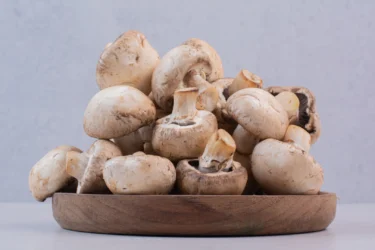
Though there are studies that show the benefits of mushroom in various conditions, but these are insufficient and there is a need for further studies to establish the true extent of the benefits of mushroom on human health.
Researchers have found that mushrooms may significantly help in weight reduction when combined with physical activity and other lifestyle modifications, such as opting for a healthy diet. In my opinion, mushrooms are rich in antioxidants that may lower the incidence of hypertension and other metabolic diseases such as obesity14.
Dr. Smita Barode, B.A.M.S, M.S.
You must consult a qualified doctor before taking any herbal supplements. Do not discontinue or replace an ongoing treatment of modern medicine with an ayurvedic/herbal preparation without consulting a qualified doctor.
Few side effects related to the consumption of mushroom include:
However, if you experience any adverse reactions to mushroom, it is advised to discontinue its intake and immediately contact a doctor or your Ayurvedic physician who has prescribed it. They will be able to guide you appropriately for your symptoms.
Eating mushrooms is not harmful if taken in moderate amounts. However, general precautions must be followed in the following conditions:
Mushrooms contain psilocybin, a psychedelic compound which may interact with the following drugs:
Therefore, you must always seek the advice of your Ayurvedic physician about the possible interaction of mushroom with other drugs and follow the prescription thoroughly, as they will know your health condition and other medications you are taking12.
Also Read: Matki (moth beans): Uses, Benefits, Side Effects, and More By Dr. Smita Barode
The scientific name of mushroom is Agaricus bisporus1.
Mushrooms or Agaricus bisporus is neither a vegetable nor fruit, instead a type of edible fungus1.
Yes, mushroom may help manage constipation; this effect is attributed to a high content of dietary fibre in them. However, more studies are needed to support these claims. Therefore, it is advised to consult a doctor for a proper treatment in case you have constipation9.
Yes, mushrooms are rich in Vitamin D which makes the bones strong and aids in calcium absorption. These features may help improve bone health. However, scientific evidence supporting this is limited and we need more studies to support these claims11.
Hess et al. conducted a study in 2018 which showed that consuming mushrooms in excess can result in flatulence and bloating. Also, mushroom poisoning following the consumption of poisonous mushroom species can occur12.
Disclaimer: The information provided here is for educational/awareness purposes only and is not intended to be a substitute for medical treatment by a healthcare professional and should not be relied upon to diagnose or treat any medical condition. The reader should consult a registered medical practitioner to determine the appropriateness of the information and before consuming any medication. PharmEasy does not provide any guarantee or warranty (express or implied) regarding the accuracy, adequacy, completeness, legality, reliability or usefulness of the information; and disclaims any liability arising thereof.
Links and product recommendations in the information provided here are advertisements of third-party products available on the website. PharmEasy does not make any representation on the accuracy or suitability of such products/services. Advertisements do not influence the editorial decisions or content. The information in this blog is subject to change without notice. The authors and administrators reserve the right to modify, add, or remove content without notification. It is your responsibility to review this disclaimer regularly for any changes.
What came first, the egg or the chicken? This question has always confused us all. Ancient China and Egypt were the first societies to domesticate hens. In India, jungle birds have been domesticated since 3200 BC for egg production. An egg contains a hard shell on the outside and a nutrient-bearing yolk on the inside. There are different varieties of eggs available in the market. Among these, chicken eggs are the most common, which can be white or brown; there is no difference in the nutritional quality between the two, the only difference being the colour and price. If you are looking for an easy and healthy food option diet that is also pocket-friendly, white chicken eggs might be your last stop! Let’s read more about the health benefits of white chicken eggs and some common considerations which you need to keep in mind before adding eggs to your diet1.
Eggs are a nutritional powerhouse, packed with the goodness of proteins, carbohydrates, vitamins and minerals and antioxidants like carotenoids.
The nutritional chart of eggs is given in the table below.
Did you know that one large boiled egg contains approximately 77 calories? Eggs are a nutritious food choice and provide various essential nutrients, including high-quality protein, vitamins, and minerals. Adding boiled eggs to your diet can be a healthy way to incorporate a nutrient-rich food into your meals8.
Dr. Siddharth Gupta, B.A.M.S, M.D (Ayu)
Eggs show numerous scientifically proven properties; some of which are mentioned below2:
Some of the potential benefits of eggs are described below.
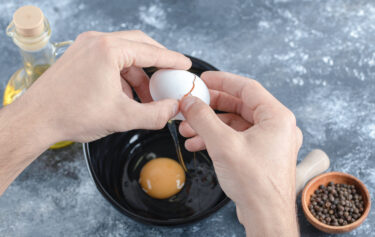
Sarcopenia is the age-related gradual loss of muscle strength, mass and function. Puglisi conducted a review in 2022, stating that the amino acid leucine in eggs stimulates muscle formation. In addition, Bagheri et al. conducted a study3 in 2020 to show the positive effect of whole-egg intake on skeletal muscles. This shows that consuming eggs may help stimulate skeletal muscle synthesis and may help improve muscle health. Thus, eggs may have the potential to manage sarcopenia. However, further research is needed to ascertain these claims as the scientific evidence available is insufficient.
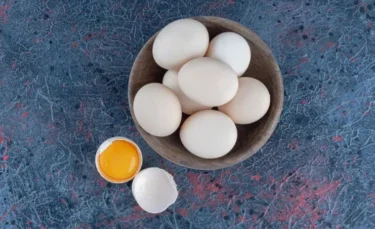
WHO defines malnutrition as the deficiency, excess or imbalance in the intake of energy and/or nutrients. The term malnutrition includes 3 major categories:
Ianannotti et al. conducted a study3 in 2017 which showed that egg supplementation in children reduced the prevalence of stunting by 47% and underweight by 74%. Sophie et al. conducted a study in 2019; the findings of this study showed that excessive consumption of eggs can result in obesity. These astonishing results show the importance of eggs in lowering the risk of malnutrition. However, we need more clinical trials to support these claims.

Hair loss or alopecia can be caused due to insufficiencies in diet, genetics or environment. Hair is mainly made up of a protein called keratin; therefore, eggs may aid hair growth because of their high protein content. Toshio et al. conducted a study4 in 2018 to assess the effect of egg yolk on hair. The findings of this study showed that egg yolk contains a key growth factor (hair growth peptide) that stimulates hair growth. This is similar to the growth factor found in minoxidil (a drug used for the treatment of alopecia). The results of this study indicate that eggs may improve hair growth and manage alopecia. However, we need more scientific evidence to support the use of eggs for managing alopecia.

In India, approximately 31.03% of elderly individuals (aged >70 years) suffer from cognitive impairment. Eggs are rich in natural cognitive enhancers like lutein, choline and tryptophan. Lee et al. conducted a study5 in 2021 to assess the impact of egg intake on memory decline in older adults. The findings of this study showed that the consumption of eggs might help reduce memory decline. Additionally, the presence of choline may help improve brain function. This indicates that consuming eggs may help improve brain function and, thus, cognitive function in the elderly. However, we need more scientific evidence to support these claims6.

Eggs are rich in antibacterial substances. The yolk and white parts are known to inhibit bacterial growth. A review carried out by Shi et al. in 2022 suggested7 that egg yolk contains trimethylamine (TMA). TMA has an antibacterial effect against E.coli (a commonly occurring harmful gut bacteria), which causes urinary tract infections, pneumonia, bloody diarrhoea, etc. Thus, the consumption of eggs may help in inhibiting the growth of E.coli and reducing the infections caused by it. However, we require more scientific studies to claim these effects in humans.
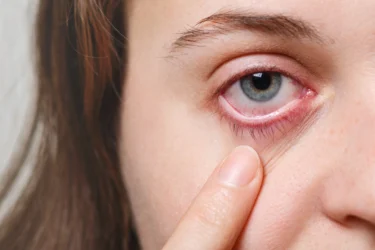
Though there are studies that show the benefits of eggs in various conditions, these are insufficient and there is a need for further studies to establish the true extent of the benefits of Eggs on human health.
You must consult a qualified doctor before taking any herbal supplements. Do not discontinue or replace an ongoing treatment of modern medicine with an ayurvedic/herbal preparation without consulting a qualified doctor.
Please note that due to their natural high cholesterol content, it is often recommended by health and nutrition professionals that adults consume fewer than three eggs per week. While eggs can be a part of a healthy diet, it’s important to moderate your intake and consider the overall balance of your dietary choices9.
Dr. Rajeev Singh, BAMS
Sophie et al conducted a study1 in 2019 which stated that egg consumption in children below five years of age can result in an egg allergy. This allergy is induced by egg proteins and includes gastrointestinal symptoms like nausea and vomiting, skin manifestations like rashes and respiratory symptoms like asthma, runny nose and nasal congestion.
Other indications of the adverse reactions of the body to eggs are described below:
However, if you experience any adverse reactions to eggs, it is advised to discontinue its intake and immediately contact a doctor or your Ayurvedic physician who has prescribed it. They will be able to guide you appropriately for your symptoms.
Including eggs in your diet can provide you with a significant amount of long chain omega-3 fatty acids, such as DHA and DPA. They contain approximately 114mg per serving, which represents 71-127% of the Adequate Intake (AI) for these essential fatty acids. This means that consuming eggs can be a valuable source of omega-3s to support your brain health and overall well-being10.
Dr. Smita Barode, B.A.M.S, M.S.
Eating eggs is okay if taken in moderate amounts. However, general precautions must be followed in the following conditions:
Also Read: Brown Egg Vs White Eggs: Decoding Nutritional Facts and Myths
There is no significant interaction of eggs with other drugs. However, you must always seek the advice of your Ayurvedic physician about the possible interaction of eggs with other drugs and follow the prescription thoroughly, as they will know your health condition and other medications you are taking.
The only difference between white and brown eggs is the colour of the shell and price, no difference is observed in the nutritional quality1.
Yes, it is best if you consume eggs fresh after buying, but if you want to store them, it is advised to refrigerate eggs as this may reduce bacterial growth and preserve them for a longer period.
Yes, eggs may help in improving thyroid function due to the presence of iodine and selenium in them. However, scientific evidence supporting these claims is limited, and we need further studies to ascertain these effects. Therefore, it is advised to consult a doctor for proper treatment in case you have an abnormal thyroid function.
Egg yolk contains antioxidants like lutein and zeaxanthin, which may have a protective role on the eyes and can reduce the risk of eye diseases. However, there is a need to conduct more studies to support these claims. It is recommended to consult a doctor for proper treatment in case you have any eye-related issues1.
Daily consumption of eggs can result in an increase in good cholesterol as well as bad cholesterol, eggs are rich in saturated fats, which can result in weight gain, and egg allergy is common in children below five years, which is characterised by respiratory and gastrointestinal symptoms1.
Disclaimer: The information provided here is for educational/awareness purposes only and is not intended to be a substitute for medical treatment by a healthcare professional and should not be relied upon to diagnose or treat any medical condition. The reader should consult a registered medical practitioner to determine the appropriateness of the information and before consuming any medication. PharmEasy does not provide any guarantee or warranty (express or implied) regarding the accuracy, adequacy, completeness, legality, reliability or usefulness of the information; and disclaims any liability arising thereof.
Links and product recommendations in the information provided here are advertisements of third-party products available on the website. PharmEasy does not make any representation on the accuracy or suitability of such products/services. Advertisements do not influence the editorial decisions or content. The information in this blog is subject to change without notice. The authors and administrators reserve the right to modify, add, or remove content without notification. It is your responsibility to review this disclaimer regularly for any changes.
Mangoes and summer seasons are a match made in heaven! The sweet and juicy taste coupled with countless health benefits justify why mango is called the “king of fruits”. Mangifera indica, mango or aam, is an important fruit in Ayurveda. It belongs to the genus Mangifera, and family Anacardiaceae which contains 30 different species. India ranks first among the major mango-producing countries. India is famous for its wide range of mango varieties, like Alphonso variety of Ratnagiri, Badami variety of Karnataka, Dasheri variety of Lucknow and Kesar variety of Gujarat to name a few. Mangoes are good for our taste buds and our health. They are also a rich source of fibre, vitamins, minerals and antioxidants like mangiferin and glucosyl xanthone. Let us read more about some mango benefits1.
Mango (Aam) is packed with various nutritional components that are given as follows. They are a good source of vitamins, minerals and antioxidants like mangiferin and glucosyl xanthone, and carotenes.
In my opinion, eating mangoes might be a way of giving your body a natural defence against certain diseases. Mangoes might have superpowers against certain types of cancers. Yes, it’s true! Thanks to the magical combination of beta-carotene and other special substances, mangoes might help against leukaemia and even slow down the progression of prostate and colon cancers11.
Dr. Siddharth Gupta, B.A.M.S, M.D (Ayu)
The mango shows numerous scientifically proven properties; some of these properties are mentioned below:
Some of the potential benefits of mango are described as follows:

Breast cancer is one of the most common cancers, leading to pre-mature death of females globally. Natural products are now becoming important sources for the discovery of anti-cancer agents. Mangifera indica may have the potential for the management of breast cancers. Banerjee et al. conducted a study in 2015 to assess the effect of mangoes on breast cancer xenografts in mice. This study3 showed that polyphenols like gallic acid, galloyl glycosides and gallotannins in mangoes might have a chemotherapeutic potential against breast cancer. This indicates that mangoes may help in managing breast cancer. However, more studies are required to support these claims.
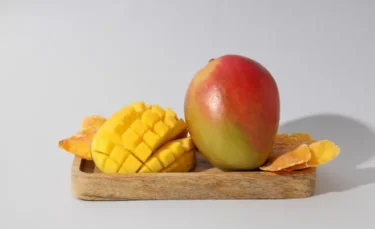
Ulcerative colitis is a chronic inflammatory condition affecting the colon and rectum. Mangoes may help in reducing inflammation because of the presence of polyphenols like gallotannins and gallic acid. Kim et al. conducted a study4 in 2016 to assess mango’s anti-inflammatory effects in a preclinical colitis model. The results of this study4 showed that mango consumption might help in managing ulcerative colitis. However, more human studies are required to ascertain these claims.
From my perspective, eating mangoes can be a tasty solution to help with constipation. In a study12, it was found that munching on mangoes might actually improve the symptoms of constipation. Thus, mangoes may be a delicious way to keep things flowing smoothly in your digestive system.
Dr. Smita Barode, B.A.M.S, M.S.

Fruits and vegetables are a rich source of bioactive compounds which may help in managing the blood glucose level. The study conducted by Evans et al. 2014 showed that mangoes may reduce blood glucose levels in both females and males. The mango contains tocopherols, carotenoids, dietary fibre, ascorbic acid, gallic acid, quercetin and mangiferin. These biologically active compounds may help in normalising blood glucose levels. However, to claim all these benefits further research and confirmation are needed. If you suspect high blood glucose levels, consult your doctor and do not self-medicate5.

Mangoes, if consumed in moderate amounts, may help achieve healthy hair and nourished skin due to its high Vitamin A content. Additionally, mangoes may act as a natural sunblock by protecting our skin and hair from damage caused due to ultraviolet rays. Therefore, there is a possibility that the consumption of mango can benefit skin and hair, but we need more human studies6 to support these claims. If you have any skin and hair related problems, consult a doctor and do not self-medicate.

Macular degeneration is a common eye disorder which causes vision loss. Mangoes are rich in antioxidants like lutein, zeaxanthin and Vitamin A, which may help deal with macular degeneration. Mango is also rich in carotene which may help in vision. Thus, it may indicate that consuming mango may help manage macular degeneration. However, there is a lack of studies6 to support these claims.
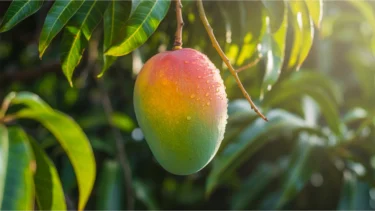
Mangoes are a good source of nutrients in the diet. The nutrient intake of mango consumers vs. non-consumers was obtained from the NHANES database. It was observed that people who consumed mangoes had a higher intake of magnesium, potassium, folate, Vitamin A, C and E and dietary fibre compared to the non-consumers. This may indicate that the consumption of mangoes can help improve nutrient intake and diet quality. However, more studies7 need to be conducted to support these claims.

Though there are studies that show the benefits of Mango in various conditions, these are insufficient and there is a need for further studies to establish the true extent of the benefits of Mango on human health.
Let me tell you a secret. Mangoes are not just delicious; they’re also packed with a special ingredient called mangiferin! This fancy-sounding compound can be found in various parts of the mango fruit, like the peel, stalks, leaves, barks, kernel, and even the stone. Mangiferin might be just the secret weapon as it is high in antioxidants13.
Dr. Rajeev Singh, BAMS
This super versatile fruit can be used in the following ways:
You must consult a qualified doctor before taking any herbal supplements or mangoes in large quantities. Do not discontinue or replace an ongoing treatment of modern medicine with an ayurvedic/herbal preparation without consulting a qualified doctor.
Also Read: Jackfruit (Kathal): Uses, Benefits, Side Effects and More!
A few side effects related to the consumption of mango include:
However, if you experience any adverse reactions to mango, it is advised to discontinue its intake and immediately contact a doctor or your Ayurvedic physician who has prescribed it to you. They will be able to guide you appropriately for your symptoms.
Eating mango is beneficial if taken in moderate amounts. However, general precautions must be followed in the given conditions:
Also Read: Water Apple: Uses, Benefits, Side Effects, And More!
Mangoes inhibit the cytochrome P450 enzymes, which are known to metabolize certain drugs like warfarin, propranolol, theophylline, etc. Inhibition of these enzymes can alter the blood concentration of drugs metabolized by this pathway. Therefore, you must always seek the advice of your Ayurvedic physician about the possible interaction of raw mangoes with other drugs and follow the prescription thoroughly, as they will know your health condition and other medications you are taking10.
The scientific name of mango is Mangifera Indica and it belongs to the family Anacardiaceae1.
Animal cell line studies support the use of mangoes for managing breast cancers. However, more studies are needed to claim these effects. Thus, it is recommended to consult a doctor for proper treatment3.
Mango is also known as the “king of fruits”1.
Yes. As mango is a rich source of Vitamin A, it may improve vision. However, it is advised to consult a doctor for proper diagnosis for vision-related problems and not consider the consumption of mango as an alternative to modern medicine6.
Consumption of mangoes in excess can cause short-term gastrointestinal disorders like stomach pain and diarrhoea and allergies in allergy-prone individuals10.
Disclaimer: The information provided here is for educational/awareness purposes only and is not intended to be a substitute for medical treatment by a healthcare professional and should not be relied upon to diagnose or treat any medical condition. The reader should consult a registered medical practitioner to determine the appropriateness of the information and before consuming any medication. PharmEasy does not provide any guarantee or warranty (express or implied) regarding the accuracy, adequacy, completeness, legality, reliability or usefulness of the information; and disclaims any liability arising thereof.
Links and product recommendations in the information provided here are advertisements of third-party products available on the website. PharmEasy does not make any representation on the accuracy or suitability of such products/services. Advertisements do not influence the editorial decisions or content. The information in this blog is subject to change without notice. The authors and administrators reserve the right to modify, add, or remove content without notification. It is your responsibility to review this disclaimer regularly for any changes.
“An individual can consider himself happy when his food is also his medicine.” Pistachios are tiny little nutritional goldmines; the healthiest and best delight one can have instantly. They are the edible seeds of the Pistacia vera tree, which belongs to the family Anacardiaceae or the cashew family. Pistachios originated in the Middle East and Central Asia. In India, the production of pistachios is highest in Jammu and Kashmir, followed by Tamil Nadu, West Bengal and Punjab. This is because pistachio trees thrive in regions with long summers and winter seasons. Depending on the size and shape of these nuts, different varieties are available in the market, like Iranian round pistachio, Iranian jumbo pistachio, Iranian long pistachio, etc.
Pistachios are ranked among the top 10 expensive nuts globally and are of economic importance. These green-hued, sweet nuts are one of the oldest nuts, which have also been mentioned in the Old Testament of the Bible as a prized food source with a rich history. Let us discover some evidence-based benefits of pistachios and some considerations to add this superfood to your dietary routine1,2.
Pistachios are highly nutritious due to the presence of vitamins, minerals, proteins, phenolic compounds and carotenoids like zeaxanthin and lutein. The nutritional components that are found in pistachios are as follows.
Nutritional value of pistachios3
Pistachios show numerous scientifically proven properties; some of which are mentioned below:
Eating a handful of pistachios as a snack can offer various health benefits. It is not only tasty, but also packed with nutrients to keep you active through the day1.
Dr. Siddharth Gupta, B.A.M.S, M.D (Ayu)
Some of the potential benefits of pistachios are described as follows:

Nuts may help in managing hyperglycaemia due to the presence of mono-and polyunsaturated fatty acids. Parham et.al conducted a study4 in 2014 to assess the effect of pistachio nuts supplementation on Type II diabetes. 12-weeks of pistachio consumption by the subjects showed a beneficial effect on glycemic control in diabetes. This indicates that pistachios may have a positive impact on diabetes. However, more studies are needed to support these claims.

Literature Studies have reported that the consumption of nuts can have a favourable effect on lipid profile. Michael et al. conducted a study5 in 2007 to assess the effect of pistachio nut consumption on serum lipid levels. This study showed that the consumption of pistachio nuts helped reduce total cholesterol and increase high-density lipoprotein or good cholesterol. This indicates that the consumption of pistachio nuts may have a beneficial impact on lipid profile. However, we need more studies to support these claims.

The prevalence of neurodegenerative diseases, including several forms of dementia, is increasing. Among the causes of these diseases, obesity is a well-known risk factor. Literature reviews support the use of pistachios for the management of obesity-related dysfunctions like neurodegenerative diseases. Domenico et al. conducted a study6 in 2020 to assess the effect of pistachio nuts on the brain in obese mice. This study showed that regular intake of pistachio nuts might help manage obesity-related neurodegenerative diseases. This indicates that the consumption of pistachio nuts may have a favourable impact on neurodegenerative diseases. However, we need more studies to support these claims in humans.

Consumption of nuts may help reduce blood pressure. Omid et al. conducted a meta-analysis7 in 2021 to assess the effect of pistachio nut on blood pressure. Results showed that pistachio nuts consumption might help reduce systolic blood pressure. This indicates that the consumption of pistachio nuts can positively impact blood pressure, but we need more studies to support these claims.

Pistachios are packed with vitamins, minerals, tocopherols, polyphenols and dietary fibre, which may help reduce the risk of colon cancer. Michael et al. conducted a study8 in 2017 to assess the anti-cancer potential of pistachio nuts. This study showed that pistachio nuts had a favourable effect on colon cancer. This indicates that the consumption of pistachio nuts may help reduce the risk of colon cancer. However, scientific evidence for this finding is limited and we need more studies to support these claims.
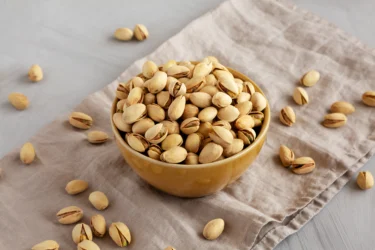
Though there are studies that show the benefits of Pistachios in various conditions, these are insufficient and there is a need for further studies to establish the true extent of the benefits of Pistachios on human health.
As per a study11, eating 3-4 pistachios everyday showed significant improvement in blood flow through the penis. This goes to show that eating pistachios may help with erectile dysfunction.
Dr. Rajeev Singh, BAMS
You must consult a qualified doctor before taking any herbal supplements. Do not discontinue or replace an ongoing treatment of modern medicine with an ayurvedic/herbal preparation without consulting a qualified doctor.
A few side effects related to the consumption of pistachios include:
However, if you experience any adverse reactions to pistachios, it is advised to discontinue its intake and immediately contact a doctor or your Ayurvedic physician who has prescribed it. They will be able to guide you appropriately for your symptoms.
Also Read: Amazing Health Benefits of the Avocado
Eating pistachios is okay if taken in moderate amounts. However, general precautions must be followed in the mentioned conditions10:
There is no significant interaction of pistachios with other drugs. However, you must always seek the advice of your Ayurvedic physician about the possible interaction of pistachios with other drugs and follow the prescription thoroughly, as they will know your health condition and other medications you are taking.
The scientific name of pistachios is Pistacia vera, which belongs to the family Anacardiaceae or the cashew family1.
Being a good source of fiber and protein, they may help in weight loss. However, more studies need to be done on humans to support these claims. Therefore, it is advised to consult a doctor for issues related to weight1.
Yes, pistachios may help manage diabetes as they have the potential to improve glycemic control. However, more studies need to be done in humans to support these claims. Therefore, it is advised to consult a doctor for better outcomes3.
Pistachios are rich in antioxidants like lutein and zeaxanthin, which may help improve vision. However, studies supporting these claims are limited and thus, it is advised to consult a doctor for a better assessment1.
Consumption of pistachios in excess can increase the risk of gout, impair the digestive process and kidney function. In allergy-prone individuals, pistachios can cause nut allergy8.
Disclaimer: The information provided here is for educational/awareness purposes only and is not intended to be a substitute for medical treatment by a healthcare professional and should not be relied upon to diagnose or treat any medical condition. The reader should consult a registered medical practitioner to determine the appropriateness of the information and before consuming any medication. PharmEasy does not provide any guarantee or warranty (express or implied) regarding the accuracy, adequacy, completeness, legality, reliability or usefulness of the information; and disclaims any liability arising thereof.
Links and product recommendations in the information provided here are advertisements of third-party products available on the website. PharmEasy does not make any representation on the accuracy or suitability of such products/services. Advertisements do not influence the editorial decisions or content. The information in this blog is subject to change without notice. The authors and administrators reserve the right to modify, add, or remove content without notification. It is your responsibility to review this disclaimer regularly for any changes.
Jaggery also known as “Gur or “Gud”, has been used extensively over the years for its many benefits. Due to the wide use of jaggery in Ayurveda, it is also called “medicinal sugar”. It is prepared by processing or boiling sugarcane juice, obtained from the sugarcane plant “Saccharum officinarum”. Jaggery is also known as gud, vellam, Bella or bellam. In an Indian diet, it is consumed either directly or used to prepare several sweet-based foods. Jaggery is used to prepare several traditional sweet dishes like karadantu, godhi huggi, chikki, gazak, and payasam1. This nutritious, unrefined sugar offers several benefits. Daily consumption of jaggery may help with asthma, cold, cough, and anaemia and may act as a natural cleansing agent.
Jaggery contains various nutritional components that are given in the table below. They are rich in a variety of compounds including vitamins, minerals, proteins, and antioxidants like selenium, Vitamin A, Vitamin C, and Vitamin E.
The solid jaggery nutritional value per 100g is as follows:2:
Scientific literature has found jaggery to show numerous properties as those mentioned below:
Some of the potential benefits of jaggery are described as follows:






Though there are studies that show the benefits of jaggery in various conditions, these are insufficient and there is a need for further studies to establish the true extent of the benefits of jaggery on human health.
Jaggery can be used in the following ways:
You must consult a qualified doctor before taking any herbal supplements. Do not discontinue or replace an ongoing treatment of modern medicine with an ayurvedic/herbal preparation without consulting a qualified doctor.
Jaggery is a traditional sweetener that is often included in meals for both its flavour and cultural significance. It is traditionally believed to help support digestion and may contribute to maintaining body warmth or promoting comfort after meals. In some practices, jaggery is also used to help with digestion. Preliminary studies have explored its potential roles in liver function and in supporting general well-being. Some individuals also use jaggery during certain times of the menstrual cycle9.
Dr. Rajeev Singh, BAMS
While jaggery is a popular traditional sweetener, it should be consumed in moderation. A few considerations include7:
However, if you experience any adverse reactions to jaggery, immediately contact a doctor or your Ayurvedic physician who has prescribed it to you. They will be able to guide you appropriately for your symptoms.
Also Read: Bael (Aegle Marmelos): Uses, Benefits, Nutritional Value & Side Effects
Eating jaggery is right if it is taken in moderate amounts. However, general precautions must be followed while consuming jaggery.
Consider replacing refined white sugar with jaggery, a traditional, less processed sweetener. When combined with natural spices like ginger, turmeric, cardamom, or black pepper, jaggery offers a flavourful alternative that many find appealing8.
Dr. Siddharth Gupta, B.A.M.S, M.D (Ayu)
There is limited data regarding the interaction of jaggery with drugs. However, you must always seek the advice of your Ayurvedic physician about the possible interaction of jaggery with other drugs, and follow the prescription thoroughly, as they will know your health condition and other medications you are taking.
Also Read: Psyllium Husk (Isabgol): Uses, Benefits & Side Effects
Jaggery, often called “medicinal sugar,” is a traditional and nutritious sweetener valued for its potential health benefits, including support for digestion, respiratory health, and anaemia. While it may complement a healthy lifestyle, jaggery should be consumed in moderation, especially by those with sugar sensitivities or diabetes, and should never replace professional medical advice or treatment.
Also Read: Pudina (Mint): Uses, Benefits, Side Effects & More!
Excessive consumption of jaggery can result in stomach pain. Freshly made jaggery can result in indigestion and allergy in individuals who are intolerant to sugar.
Yes, the consumption of jaggery may help regulate the menstrual cycle, but there are not many studies to support this claim. Consult your doctor for appropriate guidance and treatment.
Yes, consumption of jaggery may help improve iron-deficiency anaemia due to its high iron content and pitta-balancing properties. However, not enough studies have been conducted to support these claims. So, it is advised to consult a doctor for proper treatment.
The sugar content in jaggery is equal to white sugar. Although, consumption in moderate quantities is safe, you must consult your doctor for appropriate advice.
Although, no significant interactions are reported with the consumption of jaggery with medicines, it is recommended to consult a doctor to assess possible drug interactions.
Jaggery is often considered healthier than refined sugar because it is less processed and retains some natural nutrients. Unlike white sugar, which mainly provides empty calories, jaggery contains small amounts of minerals such as iron, potassium, calcium, and magnesium. It also has trace antioxidants that may support digestion and help cleanse the body.
Jaggery can be eaten daily in small amounts as it provides natural energy and some essential minerals. However, it is high in sugar and excess intake may raise blood glucose levels. People with diabetes, obesity, or metabolic disorders should consult a doctor or dietitian before consuming jaggery regularly.
Disclaimer: The information provided here is for educational/awareness purposes only and is not intended to be a substitute for medical treatment by a healthcare professional and should not be relied upon to diagnose or treat any medical condition. The reader should consult a registered medical practitioner to determine the appropriateness of the information and before consuming any medication. PharmEasy does not provide any guarantee or warranty (express or implied) regarding the accuracy, adequacy, completeness, legality, reliability or usefulness of the information; and disclaims any liability arising thereof.
Next Page »« Previous Page